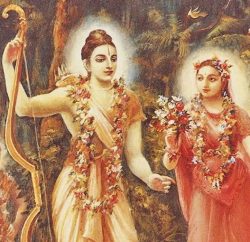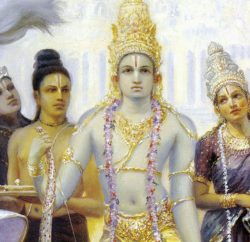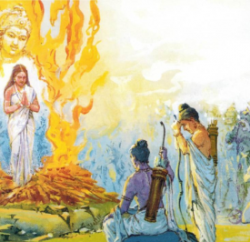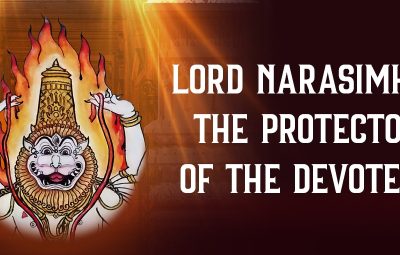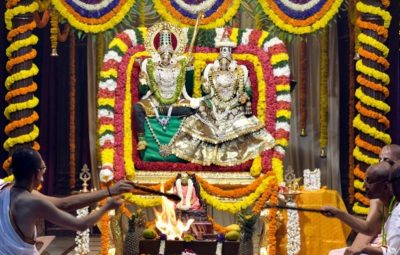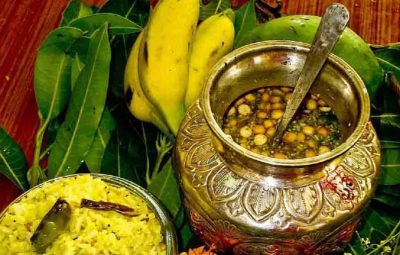Jaya Sri Ram! As we enter into the auspicious ten days of the Dasara, which will culminate in the Vijayadashami, the day of victory of Good, represented by Lord Rama over the Evil-Ravana; we bring you a series of narrations from Ramayana, describing ten transcendental qualities of Lord Ramachandra, one for every day of the Dussehra.
Please read and relish, like and share these articles, and you may also leave your comments to us.
Table of Contents
Quality 9: Lord Rāma, the altruistic
He is altruistic who is selfless and is always concerned for the well-being of others. Lord Rāma, being a kshatriya, never desired to attain a throne, for which many would kill their family members.
One such instance previously mentioned states how altruistic Rāma unarguably accepted his exile and resigned from the throne, leaving it for his younger brother Bhārata.
The epic of Rāmāyaṇa majestically narrates the aftermath of the ferocious war between the ever altruistic Lord Rāma and the selfish Demon King Rāvaṇa.
The Battlefield
The Demon king Rāvaṇa fell from his chariot with a loud cry. To their disbelief, everyone gazed at His still body that lay on the ground. Realizing that invincible Rāma had slain their master, the remaining Rākṣasas fled in every direction. They shed tears of grief. The monkeys leapt and chased the fleeing Rākṣasas, shouting with joy. 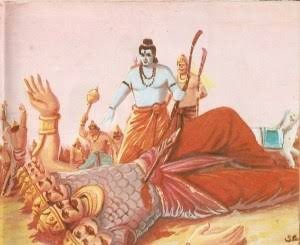
The sound of drums and other celestial instruments echoed from the sky. Delightful breezes blew on the battlefield carrying heavenly fragrance. A shower of dazzling flowers fell from the sky and covered Lord Rāma’s chariot. The gods and ṛṣis praised invincible Rāma. The battle was over. Rāma climbed down the chariot and was surrounded, by Lakṣman, Sugrīva, Hanumān, Aṅgada, Jāmbavān and Vibhīṣaṇa, who praised and cheered Him for His incredible feat.
After witnessing Rāvaṇa’s destruction, the gods and ṛṣis departed joyfully for their various heavenly abodes. Mātali bowed before Rāma and received permission to return with his chariot to Indra. Rāma watched as the celestial vehicle rose high into the sky and disappeared.
The Lamentations
As Rāma was busy bidding farewell to the celestials. Vibhīṣaṇa began to lament as he gazed upon his brother’s dead body. He spoke while tears rolled down his cheeks, “Alas, O Rāvaṇa, how have you been killed? The very fate which I predicted has come true. Overcome by lust, greed and anger, you have met the sure result of harbouring these three mortal enemies of the soul. O my brother, now that you fell dead, everything seems void. All of Laṅkā is lost.”
Although shunned by Rāvaṇa, Vibhīṣaṇa had loved his brother and had always desired his welfare.
Rāvaṇa’s wives then appeared on the battlefield. They rolled on the ground and cried in agony. Rāvaṇa’s principal wife, Mandodarī fainted upon seeing her husband dead on the battlefield. After regaining her senses, she gazed upon his face and lamented aloud, her voice choked, eyes full of tears, “Alas, my lord! You—who struck terror into the hearts of the gods, Gandharvas, Siddhas and even great ṛṣis—now lie killed by a mere mortal who came walking from Ayodhyā, a city of humans. I do not consider Rāma to be an ordinary man. He must be the Supreme Personality of Godhead since none other could have laid you low.”
Mandodarī unable to contain her grief, continued to cry, pitifully.
The renunciation
As Vibhīṣaṇa continued to cry out. Lord Rāma approached him and placed an arm around him, consoling him with soft words. Lakṣman also consoled the grief-stricken Vibhīṣaṇa by telling him spiritual truths. 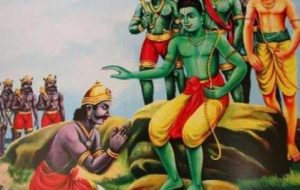
Lord Rāma’s fury with the Rākṣasas had subsided. Altruistic Rāma desired to install the pious Vibhīṣaṇa as its righteous ruler to quickly re-establish order in the devastated city.
Although Lord Rāma, after killing Rāvaṇa and the majority of evil demons, easily could have captured Vibhīṣaṇa and take up the throne of Laṅkā. At least he could have annexed Laṅkā along with Bhārata’s existing Kingdom. But altruistic Rāma had never thought of any throne, let alone the throne of Laṅkā.
All He worried about was to get back to his long-separated wife. But before that, to instantly perform the funeral of Rāvaṇa. He stayed firm and kept advising Vibhīṣaṇa to perform the funeral of his brother, explaining to him all the scriptural principles.


